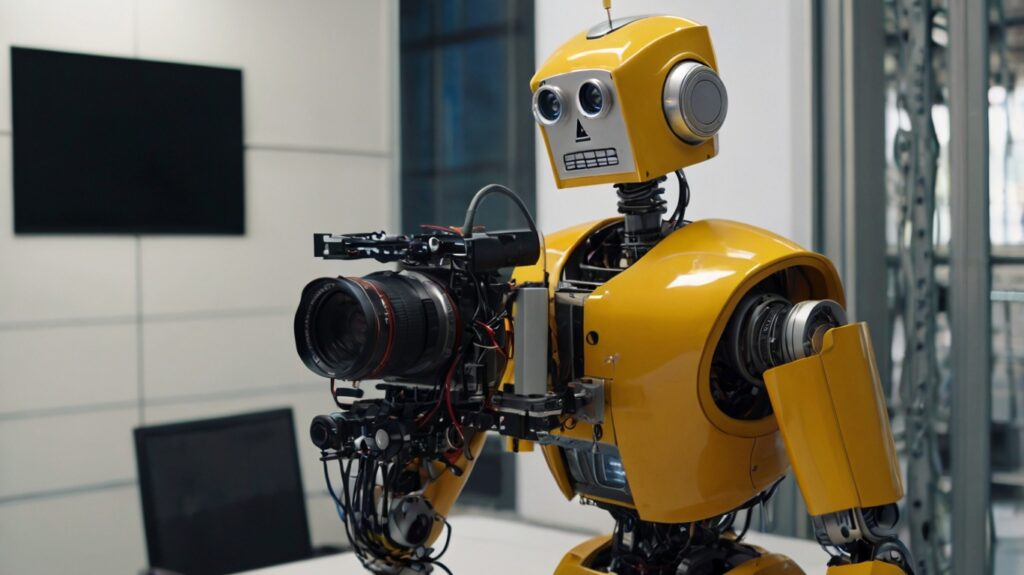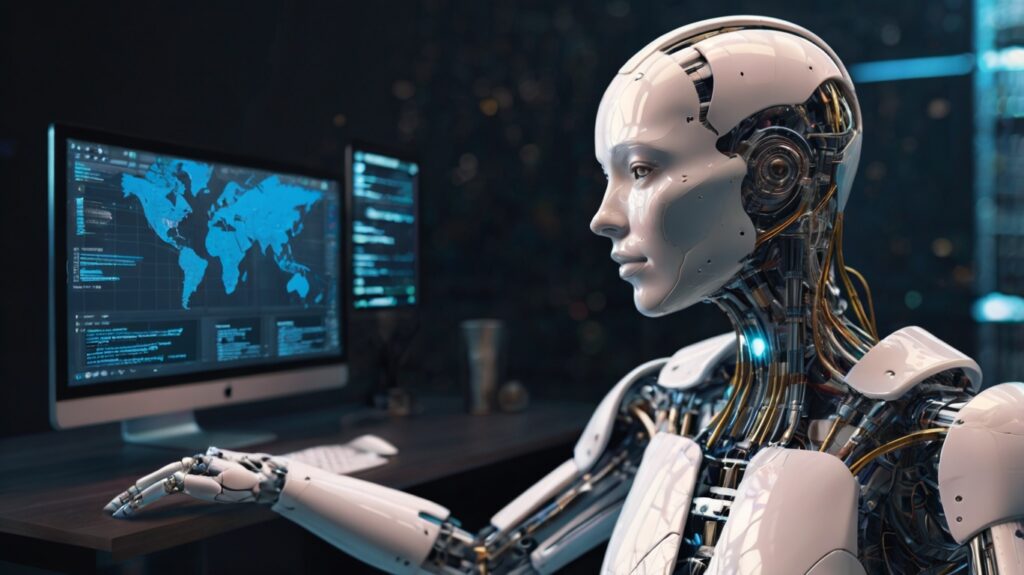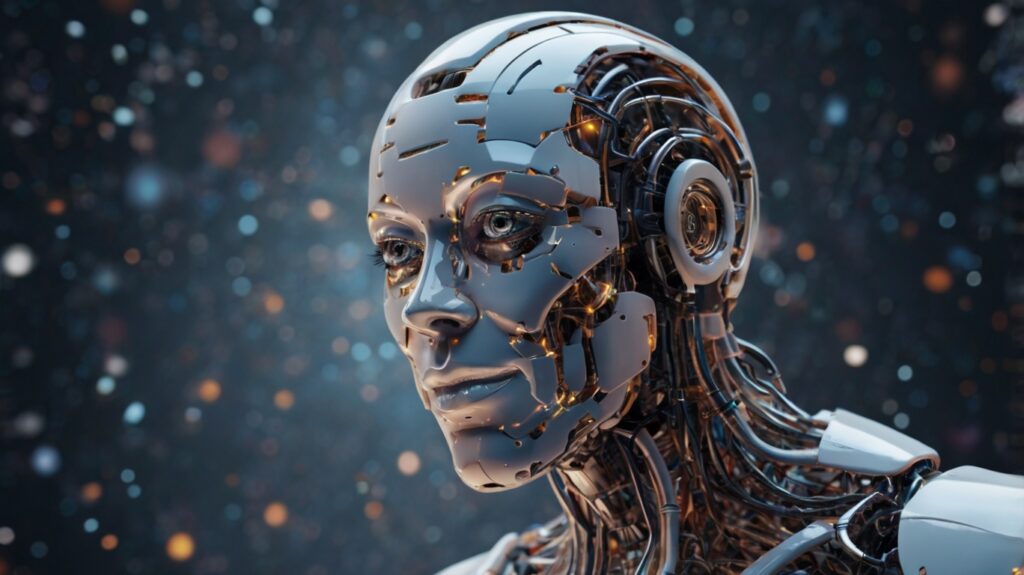In today’s digital age, content reigns supreme. Businesses are constantly striving to create fresh, engaging content that resonates with their target audience. However, keeping up with the demand for high-quality content can be a daunting task. This is where Artificial Intelligence (AI) steps in, offering a revolutionary approach to content creation.

Table of Contents
ToggleAI for Content Creation: A Game-Changer
AI for content creation refers to the use of artificial intelligence technologies to automate and enhance various aspects of the content creation process. This can include everything from brainstorming ideas and generating outlines to writing drafts, optimizing content for search engines, and even creating multimedia content like videos and images.
The impact of AI on content creation is undeniable. Here are some key benefits it offers:
Increased Efficiency
AI can automate repetitive tasks such as research, data analysis, and content formatting, freeing up valuable time for human creators to focus on strategic initiatives and creative aspects.
Content Scalability
With AI, content creators can produce a higher volume of content without compromising on quality. This is particularly beneficial for businesses with large content requirements or tight deadlines.
Improved Personalization
AI can analyze user data and audience preferences to personalize content for individual users. This results in a more engaging and relevant content experience.
Enhanced Creativity
While AI doesn’t replace human creativity entirely, it can spark new ideas and help creators overcome writer’s block by generating different content formats and variations.
Data-Driven Content Optimization
AI can analyze content performance metrics to identify what resonates with the audience and what needs improvement. This data-driven approach allows creators to continuously refine their content strategy.

Use Cases of AI for Content Creation
AI’s applications in content creation are vast and ever-evolving. Let’s delve into some specific use cases that showcase the power of AI:
Content Ideation and Brainstorming
Struggling for content ideas? AI can help! AI-powered tools can analyze trending topics, user search queries, and competitor content to suggest relevant content ideas that align with your audience’s interests.
Content Writing and Generation
AI can assist with writing various content formats like blog posts, website copy, product descriptions, and even social media captions. You can provide a few keywords or a brief outline, and AI can generate a draft that you can then edit and refine.
Content Editing and Proofreading
AI can act as a virtual editor, checking for grammar mistakes, typos, and factual errors. This ensures your content is polished and error-free before publishing.
Content Personalization
AI can analyze user data to tailor content to specific audience segments. This can involve personalizing headlines, product recommendations, and even the overall tone of voice used in content.
SEO Optimization
AI can optimize content for search engines by suggesting relevant keywords, ensuring proper meta descriptions and title tags, and analyzing content structure for better searchability.

Multimedia Content Creation
AI is making inroads into the creation of multimedia content as well. Tools can generate realistic images, music, and even short videos based on user input. This can be extremely beneficial for creating engaging visuals to accompany your written content.
Content Repurposing
Don’t have time to reinvent the wheel? AI can help repurpose existing content into different formats. For instance, an AI tool can transform a blog post into an infographic or a video script, maximizing the reach and value of your content.
The Human Touch Remains Essential
While AI provides remarkable assistance, it’s important to remember that it’s not a replacement for human creativity and critical thinking. AI-generated content often lacks the unique voice, perspective, and emotional intelligence that human creators bring to the table. The ideal approach involves leveraging AI as a powerful tool to streamline processes and enhance content creation, while human creators focus on the strategic aspects like developing content themes, establishing brand voice, and injecting creativity and personality into the content.
The Future of AI for Content Creation
The future of AI for content creation is brimming with exciting possibilities. As AI technology continues to evolve, we can expect even more sophisticated tools that can generate human-quality content, understand complex emotions and context, and even adapt content based on real-time user reactions. However, it’s crucial to address ethical considerations surrounding AI-generated content. Transparency is key, ensuring users are aware when they are interacting with AI-powered content. Maintaining the authenticity and originality of content will remain paramount in building trust and credibility with audiences.

Conclusion
AI is revolutionizing the landscape of content creation. By embracing AI as a valuable partner, businesses can increase content output, improve content quality, and ultimately achieve their marketing goals more effectively. As AI continues to develop, the possibilities for creating engaging and impactful content are truly boundless.
FAQs (Frequently Asked Questions)
No, AI is not meant to replace human content creators. It’s a powerful tool that can automate tasks, free up your time, and spark new ideas. However, the human touch remains essential for crafting unique, creative, and emotionally engaging content.
AI content quality varies depending on the tool and the level of human input. AI can generate decent drafts, but it often lacks the depth and nuance of human writing. It’s crucial to edit and refine AI-generated content to ensure it’s accurate, engaging, and aligns with your brand voice.
There are many AI content creation tools available online, some free and some with paid subscriptions. These tools offer features like content ideation, writing assistance, editing and proofreading, SEO optimization, and even multimedia content creation.
Transparency is key. Be upfront with your audience when using AI-generated content. Additionally, be mindful of potential biases in AI algorithms and ensure your content is accurate, unbiased, and respectful.
The future is bright! We can expect AI to become even more sophisticated, generating high-quality content, understanding complex emotions, and adapting to user reactions in real-time. However, ethical considerations around originality and user trust will remain crucial.

For the reason that the admin of this site is working, no uncertainty very quickly it will be renowned, due to its quality contents.
This blog is not just about the content, but also the community it fosters I’ve connected with so many like-minded individuals here
This blog has opened my eyes to new ideas and perspectives that I may not have considered before Thank you for broadening my horizons
I very delighted to find this internet site on bing, just what I was searching for as well saved to fav
I just like the helpful information you provide in your articles
I do not even understand how I ended up here, but I assumed this publish used to be great
Nice post. I learn something totally new and challenging on websites
Nice post. I learn something totally new and challenging on websites
This is really interesting, You’re a very skilled blogger. I’ve joined your feed and look forward to seeking more of your magnificent post. Also, I’ve shared your site in my social networks!
I very delighted to find this internet site on bing, just what I was searching for as well saved to fav
I truly appreciate your technique of writing a blog. I added it to my bookmark site list and will
Great information shared.. really enjoyed reading this post thank you author for sharing this post .. appreciated
This was beautiful Admin. Thank you for your reflections.
I like the efforts you have put in this, regards for all the great content.
I really like reading through a post that can make men and women think. Also, thank you for allowing me to comment!
You’re so awesome! I don’t believe I have read a single thing like that before. So great to find someone with some original thoughts on this topic. Really.. thank you for starting this up. This website is something that is needed on the internet, someone with a little originality!
I do not even understand how I ended up here, but I assumed this publish used to be great
This is really interesting, You’re a very skilled blogger. I’ve joined your feed and look forward to seeking more of your magnificent post. Also, I’ve shared your site in my social networks!
There is definately a lot to find out about this subject. I like all the points you made
I do not even understand how I ended up here, but I assumed this publish used to be great
Pretty! This has been a really wonderful post. Many thanks for providing these details.
Very well presented. Every quote was awesome and thanks for sharing the content. Keep sharing and keep motivating others.
Good post! We will be linking to this particularly great post on our site. Keep up the great writing
I’m often to blogging and i really appreciate your content. The article has actually peaks my interest. I’m going to bookmark your web site and maintain checking for brand spanking new information.
Great information shared.. really enjoyed reading this post thank you author for sharing this post .. appreciated
This is my first time pay a quick visit at here and i am really happy to read everthing at one place